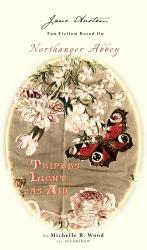inspiration + perspiration = invention :: T. Edison ::

A collection of one-shots based on Northanger Abbey: drabbles, flash fiction, missing scenes, and more. Title from Shakespeare's Othello, as quoted by Jane Austen in Chapter One. Now available as an eBook via Draft2Digital.
Over the course of two months Henry had developed a certain picture of little Fullerton and its populace: cheerful and peaceful, without distinction but possessing a certain rustic charm. Catherine's correspondence largely consisted of children and matrons, and occasionally Mr. Allen's statements or Mr. Morland's sermons. Few if any other inhabitant merited much description.
This idyll became increasingly difficult to maintain with the introduction of one George Parry into the narrative.
His first mention had quite escaped Henry's notice, for the name usually implied the youngest Morland brother. It soon became clear that a different person was meant, one he then assumed to be much older, only to realize the man could not be more than four or five years his senior. Some connection existed between the families which he did not fully understand, and it was evident that the younger generation had grown up together. The Parrys' son had only recently returned home for a visit, and was usually mentioned in mixed company, but always as George:
"George and his mother came to visit this morning."
"It is so peculiar it should rain just as George predicted on Sunday."
"We went by the market road today and met George, then all walked together to see his setter."
For of course George Parry owned a dog, and a splendid new beaver hat, not to mention many a winsome tale to divert the neighborhood. But after all, such things should be of no concern to Henry, except that someone new provided Catherine with an outlet for more society and comfort. He determined not to mind the fellow further.
Her next letter put this resolution to the test:
"Mr. Parry has determined to hire musicians for his Midsummer party and make it a true assembly. We have convinced James to come, for aught he is still very solemn and says he will not lead anyone except his sisters, for Sally is attending too. I could wish you were here to lend your advice regarding our dress, but will try to describe it afterwards, as there is not time before I mail this. I do not mean to dance often, but will with James, and Richard, and George has asked me as well. But I am most looking forward to talking after our set is over, for he has been all the way to Scotland and tells the most interesting stories, and furthermore kept a journal with some very pretty sketches."
The remainder of these tidings, all about Mr. Allen inviting them in his carriage and Mrs. Allen loaning her maid to do their hair, were barely noticed. His mind was not captivated by that couple's foibles, nor lace and muslin and shoe petals, but the increasingly unavoidable allure of Mister George Nonsuch.
Just how long was this man able to take a holiday? Catherine had hinted at some profession but not explained quite well enough to account for this abundance, and while at first curious, Henry had yet to inquire further; her precious letters were already monopolized enough by someone twice described as "very clever." Certainly he enjoyed far more leisure than most rising men with little inheritance, and the Parrys did not appear any more affluent than the Morlands. Perhaps he was paid to gad about by the Royal Society or in favour with some indulgent, indolent relation. Mayhap he had a wretched education and danced poorly. Yet what did that matter if indeed he was able to paint vivid adventures on the canvass—eager for more than Fullerton could offer—spread before him, and fully present where absent parsons with empty promises were not?
These increasingly bitter musings were cut short when Henry realized he was trodding very close to jealousy, causing him to drop the envelope he had begun tapping against his desk with increasing vehemence. The realization was mortifying; was he so weak, so doubtful of Catherine's constancy, that he begrudged her the pleasure of a rare merry evening when he himself had wasted thrice as many hours with as many partners over the years? And what if this Mr. Parry gave her joy? should he not be glad for it, especially when some of her notes were sprinkled with the evidence of her unhappiness at their separation?
He wanted to see her right then, to confess the fault, or at least be assured of forgiveness, and laugh together.
Well there was no point in feeding the green-eyed monster, not when he had paper and pen at hand. Nay, how could a man claim maturity enough for marriage, if he behaved like a petulant boy at the first distress? Henry forced himself to write several cheerful lines straightaway, not once indulging his wit regarding her partner, instead imitating the attitude he wished to embody, and catching more and more of the spirit as he wrote.
Turning back some of her pages as guide to his, he found a reward crosswritten on the last:
"I wish, like Emily, I could write verses when my feelings are high, but I fear my attempts were very ill. Know that I would ten thousand times rather sit at home in Woodston's parsonage. I pray you are safe, and well, and eagerly look forward to the day when we are never parted more."
Title from Chapter 1 of Northanger Abbey, as quoted from Shakespeare:
“Trifles light as air,
“Are, to the jealous, confirmation strong,
“As proofs of Holy Writ.”
Edited 6/24/2022: Austen spelled the name "Parry" instead of "Perry."





